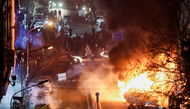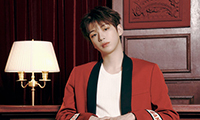Staff Reporter
Almost five in 10 people say they will vote for candidates from the largest opposition Grand National Party (GNP) in the local elections in May, according to the latest opinion poll.
Roh Moo-hyun is expected to recognize by midyear that he will become increasingly powerless, political experts said.
In the survey of 1,010 adults conducted Dec. 27-28, 46.3 percent of the respondents said they will give support to GNP candidates in the May 31 local elections, followed by 20.9 percent for the ruling Uri Party and 8.1 percent for the pro-union Democratic Labor Party.
``It’s actually a midterm evaluation of the government,’’ Yoon Eun-key, political affairs commentator in Seoul, said. ``If the Uri Party fails to obtain good results, a lame duck government will come much earlier. In addition, presidential hopefuls, like Lee Myung-bak, will increasingly raise their voices against the government’s politics.’’
For the first time in The Korea Times poll track, Seoul City Mayor Lee Myung-bak, a GNP member, received the strongest approval among the presidential aspirants for 2007.
If the current trend remains unchanged, the political landscape will not undergo a big transformation in May and will subsequently affect the presidential race in 2007, Yoon said.
A total of 139 heads of cities, counties and ward offices are currently GNP members, while only 34 are from the ruling Uri Party. The opposition party also leads the rival party 13 to 2 in the number of heads of metropolitan and provincial governments.
The Korea Times and its sister paper Hankook Ilbo commissioned Media Research to conduct the New Year survey. The poll has a plus or minus 3.1-percent margin of error and a 95 percent confidence level.
The telephone survey showed that GNP standard-bearers for the May elections drew support from those in their 50s (59.6 percent), housewives (54 percent), residents in North Kyongsang Province (65.2 percent) and those in South Kyongsang Province (61.1 percent).
Supporters of Uri Party candidates were those in their 20s (28.0 percent), blue-collar workers (28.2 percent), white-collar workers (28.4 percent) and residents in the Cholla provinces (32.4 percent).
The approval rating of the GNP rose to a record 39.2 percent, followed by 22.9 percent for the Uri Party.
As for the job approval rating of the president, 31.8 percent of respondents reacted in a positive way. But 67 percent of people thought that Roh could do much better.
Lee Myung-bak placed first in the survey with 23.3 percent of respondents saying that the Seoul Mayor is the most appropriate candidate to become the next president. Former Prime Minister Goh Kun was only 0.5-percentage point behind Lee.
Nearly 50 percent of the respondents said the current five-year, single-term presidency is the optimum choice for South Korea, while more than 27 percent said the country should introduce a four-year, two-term presidency.
Half the people said they want to see experts joining the government in the upcoming Cabinet reshuffle.
Seven out of 10 people thought that South Korea’s economy should improve in the New Year. Around 40 percent of the interviewees said they want the government to create more jobs.
More than 42 percent of those polled marked corruption and the gap between the rich and the poor as the two top priorities the government should tackle this year.
im@koreatimes.co.kr
스마터리빙
more [ 건강]
[ 건강]이제 혈관 건강도 챙기자!
[현대해운]우리 눈에 보이지 않기 때문에 혈관 건강을 챙기는 것은 결코 쉽지 않은데요. 여러분은 혈관 건강을 유지하기 위해 어떤 노력을 하시나요?
 [ 건강]
[ 건강]내 몸이 건강해지는 과일궁합
 [ 라이프]
[ 라이프]벌레야 물럿거라! 천연 해충제 만들기
 [ 건강]
[ 건강]혈압 낮추는데 좋은 식품
[현대해운]혈관 건강은 주로 노화가 진행되면서 지켜야 할 문제라고 인식되어 왔습니다. 최근 생활 패턴과 식생활의 변화로 혈관의 노화 진행이 빨라지고
카테고리 최신기사
- 4기 폐암 치료
- 운명의 한일전, 韓 4강 진출 시 확정... ‘어떻게 이런 행운이’ 日 준결승 선착, 승부차기 끝에 요르단 격파
- 뜨거운 ‘韓日 동맹 라인’ 이토 AS→김민재 골 ‘열도 홀렸다’... 일본 “콤파니 황태자들, 완벽히 해냈다” 찬사
- 마인츠, 하이덴하임 2-1 꺾고 ‘꼴찌 탈출’
- ‘환상 1호골+최고 평점’ 김민재 특급 맹활약, 뮌헨에서 가장 빛났다... ‘17G 무패’ 압도적 우승 페이스
- 이재성이 마인츠 살렸다! 2경기 연속 ‘미친 택배’ 도움... 마인츠, 하이덴하임 잡고 드디어 ‘꼴찌 탈출’
- 한국 U23 아시안컵 8강 상대 ‘호주’ 확정... 중국은 D조 2위 진출
사람·사람들
more
인터뷰-한국어진흥재단… “한국어 확대 체계적으로”
차세대 한국어 및 한국문화 교육을 목표로 활동해 온 한국어진흥재단이 2026년 제16기 이사회에서 유니스 이 이사를 신임 이사장으로 선출하며 …

캘리포니아 태권도협회 이취임식
캘리포니아 태권도협회(CTU) 신년회 및 회장 이·취임식 행사가 지난 10일 오렌지카운티 한인회관에서 열렸다. 이날 행사에서는 용호재 관장이 …
1945년 해방둥이 모임 신년모임
올해로 창립 11주년을 맞은 1945년생 해방둥이 모임(회장 최용자)은 지난 10일 해피 노래교실에서 신년모임을 열고 회원 간 친목을 다졌다.…
전남대 남가주 동문회 신년회
전남대 남가주 총동문회(회장 차흥주)는 지난 10일 아리수 식당에서 동문과 가족들이 참석한 가운데 2026년 신년회를 개최했다. 이날 참석자들…
도산사업회 신년하례식 26일 아로마센터 5층
미주 도산안창호기념사업회(회장 데이빗 곽)는 오는 26일(월) 오후 5시30분 LA 한인타운 아로마센터 5층 더원 뱅큇홀에서 ‘2026 신년하…
많이 본 기사
- 트럼프 “건강보험사 대신 개인에 보조… 1
- 국립공원 방문시 시민권·영주권 확인한다
- 대장암 위험 높이는 생활 속 잘못된 습관 5가지
- 식후 ‘블랙커피’ 한 잔, 당뇨약만큼 효과 있다
- 미네소타서 또… 이민단속 저항 남성 … 1
- ‘그린란드 담판’ 깨졌다… 덴마크·나… 2
- 결혼 앞둔 한국인 남성 태국 열차 사… 2
- 치명적 독버섯 ‘데스캡’ 확산 비상
- 보모와 불륜 북VA 남성, 완전범죄 노리고…
- 징역 5년 선고에 굳은 얼굴, 입술 깨문 尹…법원 앞엔 지지자
- 자동차 재산세 폐지 법안 나올까 2
- 美 “친미경제블록 구축…모든 양자관계에서 상업적 거래 추진”
- 종합특검법, 與주도로 국회 통과…지선까지 ‘특검수사’ 전망
- 엘리베이터로 옮겼나, 사다리차로 옮겼나…김병기 금고 오리무중
- LA 올림픽 티켓 예약 열기 첫날부터 ‘후끈’
- [인터뷰] “당뇨, 몸이 보내는 신호 잘 살펴보고 대처”
- 동포들 우롱하는 ‘글로벌 인재사업’
- “대기자 명단 신청 접수하세요”
- 신차 가격 고공행진… ‘100개월 할부’까지 등장
- 김우빈, ‘♥신민아’가 기다리는 집으로..새신랑의 퇴근길
- “맛있는 음식 저렴하게 즐겨볼까”…레스토랑 위크 시작
- 공립고교에 ‘풍물패 동아리’ 떴다
- 캔디스 조 커미셔너 가주 민권위원 지명
- 고가 주택 ‘찔끔’…저소득층은 ‘인상 폭탄’
- 기대 수명 120세 시대… 알츠하이머는 최후의 불치병으로 남을까
- ‘별거 고백’ 슈, ♥임효성과 두 달 째 연락 두절.. “화해하고 파” 속내 고백
- 자랑스러운 한인상에 아브라함 김 전 CKA 대표
- 하버 전 레이븐스 감독, 자이언츠 사령탑 부임 초읽기
- 한국 ‘여권 파워’ 6년 연속 최상위권
- 롱텀케어가 있는 어뉴이티?
- 자동차 재산세 폐지 법안 나올까
- 넷플릭스, 워너 인수금액 전액 현금으로
- “‘BTS 초청’ 선거 공약 현실이 됐어요”... ‘아미’ 멕시코 장관, 진과 만남 영상 공개
- ISS 우주비행사 4명 지구 안착… 건강문제로 조기 귀환
- 테슬라, 자율주행 소프트웨어 구독제
- 이란 공격 보류… 항모전단은 중동으로
- 미, 그린란드 사려면 얼마 줘야하나?
- ‘트럼프 압박’에 손잡은 中·加…전기차·유채씨 관세 인하 합의
- 5천피 눈앞… 국민연금 기금, 1,500조 고지 넘었다
- 가자지구 과도기 ‘행정국가위원회’ 카이로서 첫 회의
- 금리 하락에 전국 주택거래 회복세
- 2026년, 401(k) 납입부터 다시 정비하자
- [조지 F. 윌 칼럼] 올 중간선거를 덜 불쾌하게 만드는 길
- 한인 2세들 ‘족쇄’ 국적법 신속 개정해야
- 타운 ‘팟홀’ 379개… “신고해야 … 2
- 국제유가, 하루 4%대 급락
- 강다니엘, 내달 9일 육군 현역 입대
- 피프티피프티 측 “안성일 5억 배상 판결=인과응보, 전 멤버 3人 등에 130억 손배소”
- [인터뷰] 연세 글로벌 YG CEO “수준 높은 대면 강의… 강력한 네트웍”
- 젊은 남녀가 춤의 마력에 빠져 금지된 사랑 이야기
1/5지식톡

-
 한국 안경을 무료 배송으로 받아보실…
0
한국 안경을 무료 배송으로 받아보실…
0안녕하세요. 서울 안암동에 위치한 ‘보고싶다 안경원’입니다.저희는 다년간 한국 고객분들께 착용감 좋은 안경테와 한국안경브랜드,고압축 도수 렌즈를 합리적인 가격에 제공해온 안경 전문점입니다.이번에 해외 배송이 가능해…
-
 미 육군 사관학교 West Poin…
0
미 육군 사관학교 West Poin…
0https://youtu.be/SxD8cEhNV6Q연락처:wpkapca@gmail.comJohn Choi: 714-716-6414West Point 합격증을 받으셨나요?미 육군사관학교 West Point 학부모 모…
-
 ☝️해외에서도 가능한 한국어 선생님…
0
☝️해외에서도 가능한 한국어 선생님…
0이 영상 하나면 충분합니다!♥️상담신청문의♥️☝️ 문의 폭주로 '선착순 상담'만 진행합니다.☎️ : 02-6213-9094✨카카오톡ID : @GOODEDU77 (@골뱅이 꼭 붙여주셔야합니다…
-
 테슬라 자동차 시트커버 장착
0
테슬라 자동차 시트커버 장착
0테슬라 시트커버, 사놓고 아직 못 씌우셨죠?장착이 생각보다 쉽지 않습니다.20년 경력 전문가에게 맡기세요 — 깔끔하고 딱 맞게 장착해드립니다!장착비용:앞좌석: $40뒷좌석: $60앞·뒷좌석 …
-
 식당용 부탄가스
0
식당용 부탄가스
0식당용 부탄가스 홀세일 합니다 로스앤젤레스 다운타운 픽업 가능 안녕 하세요?강아지 & 고양이 모든 애완동물 / 반려동물 식품 & 모든 애완동물/반려동물 관련 제품들 전문적으로 홀세일/취급하는 회사 입니다 100% …
케이타운 1번가
오피니언

한인 2세들 ‘족쇄’ 국적법 신속 개정해야

노동법 준수로 공정의 새해 열자
 조지 F·윌 워싱턴포스트 칼럼니스트
조지 F·윌 워싱턴포스트 칼럼니스트 [조지 F. 윌 칼럼] 올 중간선거를 덜 불쾌하게 만드는 길
 최규성 삼성서울병원 이식외과 교수
최규성 삼성서울병원 이식외과 교수 [로터리] ‘토의 간’
 전병두 서북미수필가협회 회원
전병두 서북미수필가협회 회원 [금요단상] 꿀벌과의 인연
 심상용 / 서울대 미술관장
심상용 / 서울대 미술관장 [미술 다시보기] 모네와 연작의 경제학
 김정곤 / 서울경제 논설위원
김정곤 / 서울경제 논설위원 [만화경] 애플·구글 ‘적과의 동침’
 한 영 재미수필가협회 회장
한 영 재미수필가협회 회장 [한영의 독서칼럼] 햇살을 향해 헤엄치기
 이규민 한식진흥원 이사장
이규민 한식진흥원 이사장 [로터리] 시간을 담그는 문화, 한국의 장
1/3지사별 뉴스

뉴욕한인회‘제123주년 미주한인의 날’ 기념식 성황
뉴욕한인회(회장 이명석)가 13일 맨하탄 뉴욕한인회관에서 개최한‘제123주년 미주한인의 날’ 기념 행사가 각계에서 활동 중인 1.5세 및 2세…
국적이탈 수속에 2년이나 걸리다니⋯

연방의회서 “한인 위상·한미동맹 제고” 한목소리
한인 이민자들이 미국에 도착한 123주년을 기념하고 한인들의 미국 사회에의 기여를 알리는 ‘제 21회 미주 한인의 날’ 행사가 13일 연방의회…
보모와 불륜 북VA 남성, 완전범죄 노리고…

한미수교 100주년 기념 조형물 재설치 가능성 보인다
샌프란시스코 공원에 설치되어 있다 철거되어 창고에 보관중인 한미수교 100주년 기념 조형물이 다시 설치될 가능성이 열렸다.한국 국회 재정경제기…
재미한국학교협의회

오늘 하루 이 창 열지 않음 닫기 



















































.png)


댓글 안에 당신의 성숙함도 담아 주세요.
'오늘의 한마디'는 기사에 대하여 자신의 생각을 말하고 남의 생각을 들으며 서로 다양한 의견을 나누는 공간입니다. 그러나 간혹 불건전한 내용을 올리시는 분들이 계셔서 건전한 인터넷문화 정착을 위해 아래와 같은 운영원칙을 적용합니다.
자체 모니터링을 통해 아래에 해당하는 내용이 포함된 댓글이 발견되면 예고없이 삭제 조치를 하겠습니다.
불건전한 댓글을 올리거나, 이름에 비속어 및 상대방의 불쾌감을 주는 단어를 사용, 유명인 또는 특정 일반인을 사칭하는 경우 이용에 대한 차단 제재를 받을 수 있습니다. 차단될 경우, 일주일간 댓글을 달수 없게 됩니다.
명예훼손, 개인정보 유출, 욕설 등 법률에 위반되는 댓글은 관계 법령에 의거 민형사상 처벌을 받을 수 있으니 이용에 주의를 부탁드립니다.
Close
x